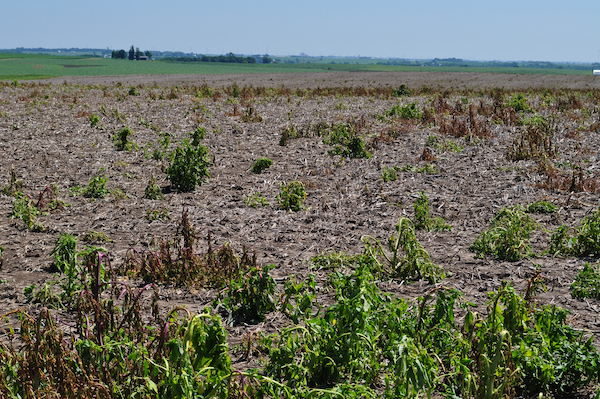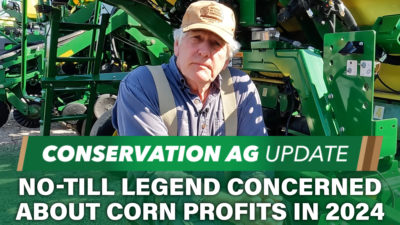By Liz Stahl and Phyllis Bongard
Farmers across parts of Minnesota have been dealing with excessively wet or persistently wet conditions that continue to delay crop planting.
As wet conditions persist and final planting dates for crop insurance in Minnesota for corn (May 31 across southern Minnesota and May 25 across northern Minnesota) and soybean (June 10) approach, farmers are faced with the decision of whether or not to plant some of their crop / take prevent plant, plant their planned crop late, or switch to a different crop. There are many factors to consider when making these decisions and each farmer will need to evaluate what options fit best with their operation and situation.
The following is a discussion of some key considerations to assist farmers in making Prevent Plant decisions:
Crop insurance, prevent plant, and financial resources
Farmers should be in contact with their insurance representative for more details on the rules of prevent plant, implications of planting during the late planting period or switching crops, any follow-up management requirements, and impacts on items such as insurance coverage and actual production history (APH). A summary of this information is available at Crop insurance: important dates, resources and tax impacts.
For more details and information from USDA’s Risk Management Agency (RMA), see their Prevented Planting website. The U of MN Farm Business Management team has also developed a decision tool, the Delayed planting and replanting evaluator to help in the decision process.
Whether or not to plant corn late
The following are some key points to consider (see Considerations for late-planted corn for more details).
-
Yield penalty– Yield potential for corn planted after mid-May begins to decline fairly rapidly according to long-term research conducted at Lamberton (1988 – 2003) and across three locations (Lamberton, Morris, and Waseca) from 2009 – 2011. Although yield impacts each year will vary, in these trials, corn yield was reduced by an average of
- 11-18% when planting was delayed until May 30.
- 16-24% when corn was planted on June 4
- 21-31% when corn was planted on June 9.
-
Hybrid maturity and selection - It is recommended to stay the course with adapted hybrids (a hybrid considered full-season for the area) until May 22. When planting delays continue, switching to an earlier relative maturity (RM) is recommended to help ensure the hybrid reaches maturity before a killing freeze. General recommendations include:
- When planting between May 22 and May 28, select a hybrid 5 to 7 relative maturity (RM) units earlier that what is considered full season for the area.
- When planting between May 29 and June 4, a hybrid 8 to 15 RM earlier is recommended.
- When planting between June 4 and 10, a hybrid 15 or more RM earlier is recommended.
- If switching to an earlier hybrid, keep in mind the agronomic traits (e.g. standability, disease tolerance), technology traits (e.g. Bt traits for above ground or below ground insect pests), herbicide resistance traits, and yield potential of the earlier hybrid.
-
Grain moisture at harvest and risks from an early frost – Switching to an earlier hybrid can help offset the risk of high grain moisture content at harvest. Wet corn at harvest can lead to added expense from drying corn. The historical guideline for the cost to dry corn has been $0.045 per point per bushel of corn, but this will vary by fuel price, dryer type, if corn is dried on the farm, etc. If you do not have actual records for your farm, the following equations from Energy costs for corn drying and cooling can be used to estimate energy use for gas-fired drying (Note these figures do not factor in the energy savings that would result from recirculating part of the dryer’s exhaust air):
- Burner: 0.02 gallons liquefied petroleum gas (LPG – mostly propane) per bushel per percentage point of moisture removed. For dryers that use natural gas, the equivalent number would be about 0.0184 cubic feet of natural gas per bushel per percentage point of moisture removed.
- Fans: 0.01 kWh electricity per bushel per percentage point of moisture removed.
In a U of MN survey of farmers after the 2019 growing season, farmers reported grain moisture ranged from 18 to 34% for corn that was planted in June (Stahl and Goplen, 2020). An early frost compounds the risk of a high grain moisture at harvest when planting is delayed.
It is important farmers consider their ability to artificially dry wet grain and dryer and storage capacity when considering to plant corn past the last planting date for crop insurance. Combining high moisture grain can slow down harvest and may also result in higher than normal harvest losses.
- Field conditions at planting – If wet conditions persist, farmers may be faced with the decision to plant corn in less-than-ideal conditions. “Mudding in” a crop can result in significantly reduced root systems in corn, which can pre-dispose the corn to further stress, reduced ability to take up nutrients and moisture, and ultimately reduced yield potential. When adjusted for planting date, corn yields were 2 bu/ac and 10 bu/ac lower when planting conditions were “slightly wet” and “very wet”, respectively, compared to “good” in the U of MN survey of farmers after the 2019 growing season.
- Pest pressure – If corn is planted much later than normal, it may be at greater risk from pests that you normally haven’t had to deal with. For example, late planted corn may be more susceptible to injury from black cutworm or true armyworm. For the most recent reports, see the Black cutworm reporting network.
- Seeding rate – It is recommended to follow best management practices for corn regardless of planting date, targeting a final stand of 32,000 to 34,000 plants per acre.
- Need corn for feed/forage or to meet marketing commitments: If you are a livestock producer who needs corn for feed or forage, or if you have contracted grain for delivery, this affects the decision process. If you don’t have the production, what options do you have to meet these needs (and at what cost)?
Whether or not to plant soybean late:
For a discussion on important yield and relative maturity considerations, see Delayed soybean planting.
Whether or not to switch from corn to soybean
- Impact on rotation - If you typically follow a corn/soybean rotation, switching from corn to soybean will mean that you will now be planting soybeans after soybean. A review of almost 750,000 fields across the Midwest found an average yield penalty of 10.3% for planting continuous soybean (Seifert, Roberts, and Lobell. 2017. Agron. J. 109(2): 541 – 548).
- Impact on diseases - Multiple years of soybean encourages soil-borne diseases like soybean cyst nematode (SCN) and sudden death syndrome (SDS). Soybean disease issues are likely a key factor in the yield penalty observed with continuous soybean. Avoiding soybean on soybean is strongly encouraged to help manage these diseases.
- Field inputs to date – If N (nitrogen) was applied for corn already, the available N can be utilized by the soybean although it will provide little benefit to soybean (in the process soybean will fix less of its own N via the nodules). Corn will make the most economic use of N applied. If corn herbicides were applied to date, this will limit what crops can be planted as any rotational restrictions must be followed.







Post a comment
Report Abusive Comment